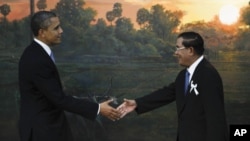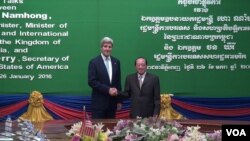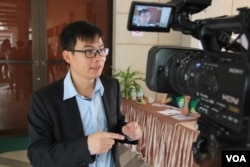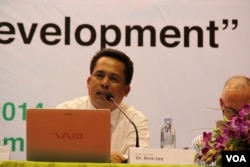As Prime Minister Hun Sen prepares for a meeting of ASEAN leaders with US President Barack Obama later this month, political analysts say the visit will be a good way for Cambodia to improve relations with the US.
Hun Sen and other leaders will meet Obama in Sunnylands, California, next week, to discuss trade and security issues.
The meeting follows the visit of US Secretary of State John Kerry to Cambodia in January. It also comes after a trip to China by Foreign Minister Hor Namhong, who, along with Hun Sen, has in recent days taken umbrage with suggestions the China trip was in response to the Kerry visit. Cambodia has shouldered criticism for its apparent siding with China during an ASEAN chairmanship in 2012.
China is a major source of aid and trade for Cambodia, but the US has tried in recent years to make more diplomatic inroads here and across Southeast Asia. Some analysts say that means a good opportunity for Cambodia to balance out its foreign policy.
“While our economy is not strong enough and reliant upon other nations, it means that we cannot have a fully independent foreign policy,” Chheang Vannarith, a lecturer in Asia-Pacific studies at Leeds University, told VOA Khmer. “So we need to improve the economy and have many of development partners.”
But that also requires “national unity,” he said. “Political parties must have a joint stance for deeper dialogue related to foreign policies. If not, those parties could face frictions and disputes, while major powers will likely be taking sides with [differing] parties, which would lead to national turmoil.”
Cambodia could gain from the current diplomatic environment, as it’s courted by both the US and China, he said. Kerry’s visit, for example, focused on trade, something Cambodia needs more of. Chheang Vannarith warned that to balance between the two sides is to “walk a very thin line” that will require specialized diplomats. Still, he said, “if we can maintain a neutral stance and balance, we can gain from both sides.”
Kem Ley, a political analyst in Phnom Penh, said China and Cambodia have “self-binding” diplomatic ties, especially since Cambodia moved away from a forum for development aid in 2012, allowing it to work directly with donors. Since then, China has provided a lot of aid, but the balance of power has shifted, he said. That means that even if it wanted to, Cambodia could not do away with Chinese aid.
“And since Cambodia needs more than a billion dollars a year to keep the government functioning, turning away its support or support for the South China Sea issue or ASEAN-China mechanisms is very hard,” he said.
Hun Sen said in a speech Friday that Cambodia remains neutral, a message echoed by Hor Namhong. Kerry has not asked Cambodia to choose sides, the foreign minister told reporters last week.
Meanwhile, the Sunnylands summit, scheduled for Feb. 15 and Feb. 16, will provide a chance for more talks between regional leaders and the US on trade and security issues, likely including the South China Sea, where four ASEAN nations have overlapping claims with China. Hun Sen and chief members of his Cabinet will be there.
Chheang Vannarith said Cambodia is likely to employ “silent diplomacy” on the South China Sea issue, and will focus on expanding trade cooperation during the summit.
Kem Ley said Cambodia’s financial dependence on China does not allow for much room on the issue. Cambodia is still following the old path of diplomacy, one reminiscent of the 1960s, when the nation fully supported China, he said. Those relations have gone through various stages, as have those with the US, in ensuing years, through the fall of the Khmer Rouge and the rise of Cambodia’s nascent democracy.
Kem Ley said Cambodia now needs to be cautious. “If we were independent and abided by the constitution, without favoring any nation and treating all countries with similar diplomacy, it would be a good thing,” he said.
And he warned that favoring one side or the other could drag the country into a conflict one day. Poor diplomacy now could have repercussions for decades, he said. “It is not different from Iraq, Afghanistan, Syria, Egypt and Morocco.”













